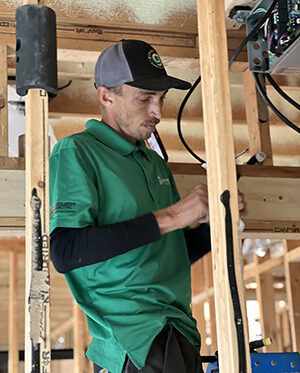Your HVAC system is the heartbeat of comfort in your home, and making sure that it operates at a high level of efficiency while also lasting for years to come is important. Knowing the right questions to ask your HVAC technician can make all the difference in safeguarding your investment and maintaining indoor comfort year-round. From efficiency concerns to safety precautions and system longevity, understanding the inner workings of your heating, ventilation, and air conditioning setup empowers you as a homeowner. At Green Dot Heating & Air in Wilmington, NC, we welcome all questions from our customers about our HVAC services. Read on to learn more about the best questions to ask your HVAC professional before the end of your next appointment.
1. Can You Explain the Current Condition of My HVAC System?
This question helps provide homeowners with a comprehensive overview of their heating, ventilation, and air conditioning setup. By asking this question, you gain insights into your system’s current efficiency, any existing issues that might affect performance, and potential maintenance requirements. Understanding your HVAC system’s condition helps you anticipate future needs, plan for repairs or upgrades, and ensure optimal comfort and energy efficiency in your home. It’s a proactive step toward staying informed about your investment and making informed decisions to keep your HVAC equipment running smoothly for years to come.
2. Are There Any Potential Issues I Should Be Aware Of?
This is a vital question that prompts HVAC technicians to identify any emerging or existing issues with your system. When you ask this, you gain insights into potential repairs, safety hazards, or efficiency concerns that might impact your home’s comfort or your HVAC system’s performance. Addressing these issues quickly helps prevent costly repairs down the road and ensures that your HVAC operates efficiently, keeping your home comfortable year-round.
3. What Steps Can I Take to Improve the Energy Efficiency of My System?
This critical inquiry helps determine what can be done to optimize your HVAC performance and reduce your overall utility costs. Your technician can recommend practical measures such as sealing ductwork, upgrading to a programmable smart thermostat, making regular filter changes, or scheduling routine maintenance visits. By prioritizing energy efficiency, you can contribute to a greener environment while enjoying enhanced comfort and lowering your energy bills. It’s an investment in sustainability and long-term savings for your home.
4. How Often Should I Change the Air Filters, and What Type Do You Recommend?
This question is important to figure out how to maintain optimal air quality and HVAC efficiency. Your technician may advise that you to change filters every one to three months, depending on factors such as system usage, system setup, and indoor air quality. They might also recommend high-efficiency filters that can capture more particles, improve indoor air quality, and reduce strain on your HVAC system. Following your technician’s guidance ensures that you’ll have cleaner air and extend the life span of your appliance.
5. Is There a Recommended Schedule for Routine Maintenance?
This question helps to make sure that you are following the recommended maintenance schedule so that your unit can operate effectively well into the future. Your technician might recommend scheduling maintenance twice per year, typically once in the spring and once in the fall, to prepare your system for seasonal cycles. Regular maintenance is often booked as a repeat service. It normally includes cleaning coils, checking refrigerant levels, lubricating moving parts, and inspecting internal and external components.
6. Are There Any Rebates or Incentives Available for Upgrading to a More Efficient System?
This is a savvy question that can save you money while improving your home’s comfort and energy efficiency. Your HVAC technician might inform you about federal, state, or local utility company incentives for upgrading to a high-efficiency HVAC system. These incentives could include rebates, financing options, or tax credits that can make the up-front cost of upgrading more manageable. Taking advantage of these programs not only reduces your initial investment but also lowers long-term operating costs through improved efficiency. It’s a smart move toward a more environmentally friendly and cost-effective home heating and cooling solution.
7. Can You Show Me How To Program My Thermostat for Optimal Efficiency and Comfort?
This question helps you maximize your HVAC system efficiency. It’s beneficial for your equipment’s longevity, and it will save you money in the long run. Your technician can show you how to program your thermostat to maintain a comfortable temperature when you’re at home and conserve energy when you’re away. They may recommend setting temperatures according to your daily schedule, using features such as vacation modes or setbacks, and adjusting settings based on seasonal changes. By mastering thermostat programming, you can potentially lower energy bills, limit wear and tear on your HVAC system, and be consistently comfortable throughout your home. It’s a small adjustment with significant long-term benefits for efficiency and savings.
8. What Are Some Signs That Indicate I Might Need To Replace My HVAC System?
Your technician might mention signs such as frequent breakdowns, increased energy bills, or uneven heating and cooling throughout your home despite regular maintenance. If your system is over 10 to 15 years old, they may also recommend replacement if repairs are becoming more costly or newer models offer significant energy savings. Sometimes, replacing your HVAC system is the more affordable option and comes with improved efficiency for greater comfort in your home.
9. Are There Any Safety Concerns Related to My HVAC System That I Should Know About?
You want your family to be safe. Your technician can highlight issues such as a carbon monoxide leak from a poorly working furnace or an electrical hazard in your electrical wiring. They can recommend safety precautions that may not be implemented in your home, such as installing carbon monoxide detectors, adhering to an ongoing safety inspection schedule, and improving your ventilation system.
10. What Are Your Recommendations for Improving Indoor Air Quality?
This question helps you determine if there is anything you can improve in your home that would lead to a healthier indoor living environment. Your HVAC technician might suggest several strategies, such as upgrading to high-efficiency air filters, improving ventilation throughout your residence, and installing an air purifier or UV lights to kill mold and bacteria. They might also recommend regular duct cleaning to get rid of allergens, dust, debris, and other pollutants. Implementing your technician’s suggestions can help you improve your indoor air quality and limit respiratory issues.
Hometown HVAC Experts at Your Disposal
Are you ready to optimize your HVAC system and make sure that your home is a comfortable space for you and your loved ones? Start by asking your HVAC technician these essential questions during your next service appointment. Take proactive steps to make sure that you understand your system’s condition, its maintenance needs, its current efficiency, and its prognosis for the near future. Comprehending your system will empower you to make informed decisions.
Whether you’re looking to improve energy efficiency or address potential issues early on, these questions help elicit valuable insights and recommendations from your technician. Don’t hesitate to take charge of your personal comfort.
At Green Dot Heating & Air in Wilmington, we can help you with all of your heating and air conditioning, smart thermostat, ductwork, and indoor air quality needs, so call us today to arrange a consultation.
Services We Offer Include:







